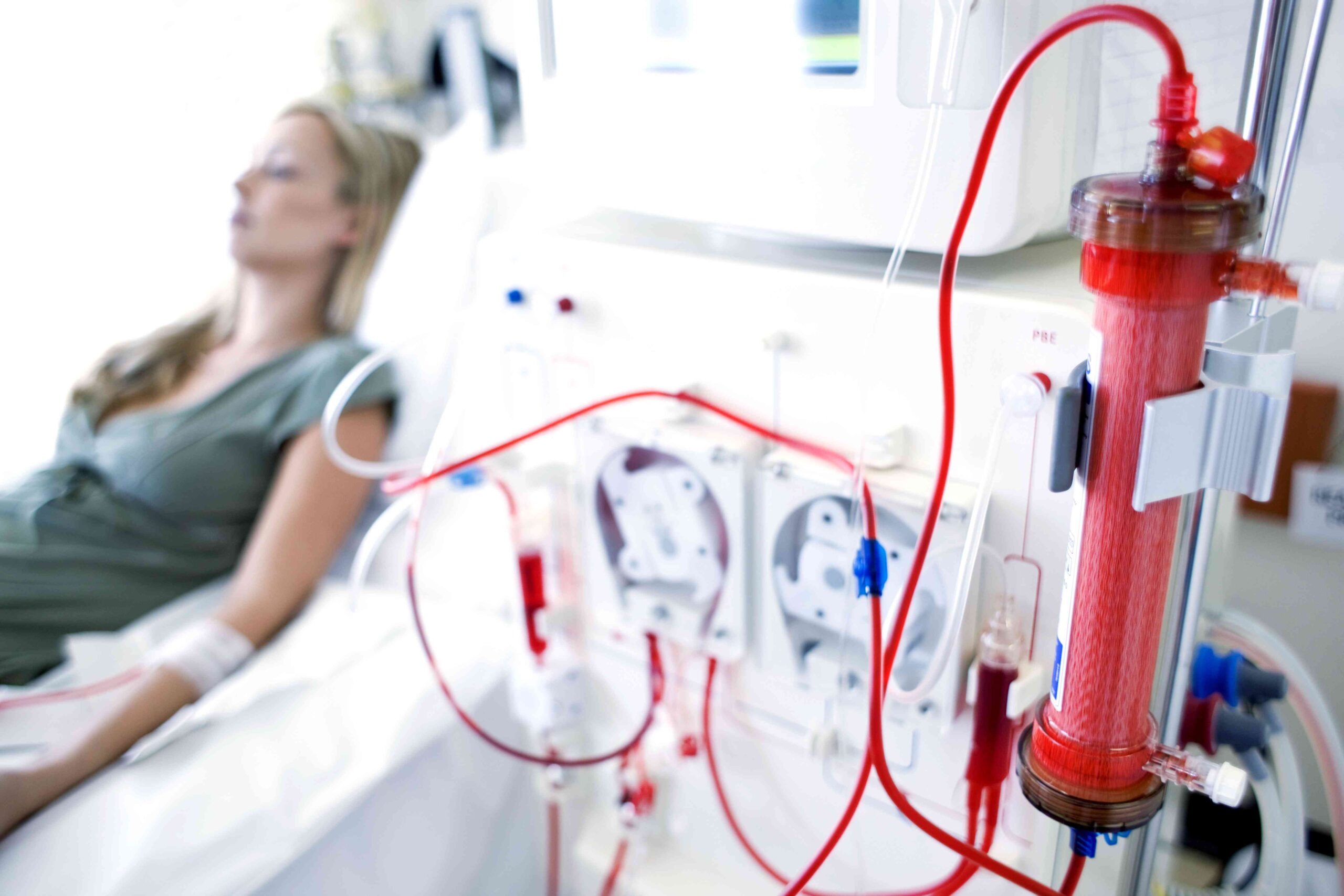
:max_bytes(150000):strip_icc():format(jpeg)/health-GettyImages-99310821-cea3825012d54a9dbb86756cda7dc4fe.jpg)
Chronic kidney failure, or end-stage kidney disease (ESKD), occurs when the kidneys no longer function effectively and cannot filter waste and extra fluid from the body. It is the fifth and final stage of chronic kidney disease (CKD).
With kidney failure, kidney function drops below 15% of normal capacity, leading to a dangerous buildup of waste products in the body and symptoms like little to no urination, itchy or dry skin, fatigue, difficulty concentrating, numbness or swelling in the arms and legs, shortness of breath, achiness, and trouble sleeping.
An estimated 37 million people in the United States have chronic kidney disease, and approximately 808,000 are living with kidney failure. Kidney failure develops after a long progression through earlier stages of CKD, where kidney function gradually declines over time. Not everyone with chronic kidney disease develops kidney failure, but those who do require dialysis or a kidney transplant to live well with their condition.
Kidney failure occurs when your kidneys have severe damage that prevents them from effectively filtering waste and toxins from your blood. These waste products build up in your bloodstream, affecting your body’s systems and vital organs and leading to a variety of symptoms:
- Peeing less frequently or not at all
- Frequent headaches, lower back pain, and muscle cramps
- Swelling in the limbs
- Itchy or dry skin that changes in color
- Nausea, vomiting, fatigue, and weakness
- Excessive thirst and loss of appetite
- Shortness of breath or foul-smelling breath (smells fishy or urine-like)
- Trouble concentrating or sleeping
- Nosebleeds, easy bruising, or bloody stools
- Sexual dysfunction
Your kidneys are your body’s filtering system, removing waste and excess fluid from the blood. They also regulate the balance of salts and minerals in your blood, help maintain healthy blood pressure, support the production of red blood cells, and contribute to bone strength. Kidney failure occurs when the kidneys sustain long-term, irreversible damage and lose their ability to perform these functions effectively. As a result, waste products and fluid build up in the body.
Several factors can increase your risk of developing kidney failure, including:
- Diabetes: Diabetes causes high blood sugar, and this spike in blood sugar can damage the blood vessels in your kidneys, leading to kidney damage.
- High blood pressure: Chronic hypertension (high blood pressure) can cause the blood vessels in your kidneys to tighten and narrow, limiting blood flow and impairing the kidneys’ ability to filter waste and excess fluid from the body. The buildup of extra fluid in the bloodstream can then further elevate blood pressure, leading to more damage and ultimately resulting in kidney failure.
- Glomerulonephritis: This condition injures the glomeruli (tiny clusters of blood vessels in the kidneys that help filter waste), which can lead to kidney failure if left untreated.
- Autoimmune disorders: Certain autoimmune conditions, such as lupus nephritis and IgA nephropathy, can lead to kidney damage and failure when the immune system mistakenly attacks kidney tissues.
- Polycystic kidney disease: A genetic condition that causes many cysts to form in the kidneys, which can enlarge and damage the kidneys and progress to kidney failure if left untreated.
Diagnosing kidney failure involves several tests that assess your kidney function. Your healthcare provider will first review your medical history and discuss your symptoms. From there, they can order a variety of diagnostic exams to learn more about your health status.
Estimated Glomerular Filtration Rate (eGFR) Test
The estimated glomerular filtration rate (eGFR) test is a blood test that assesses kidney function by estimating how much blood passes through the glomeruli (tiny filters in your kidneys) per minute. This test measures levels of creatinine in the bloodstream—a waste product from the normal wear and tear of muscles in the body—to determine how efficiently your kidneys remove waste and extra fluid from your blood.
Healthy kidneys filter about half a cup of blood every minute, removing creatinine and other waste products from the blood. If the kidneys are not functioning properly, creatinine accumulates in the bloodstream. Since creatinine production varies from person to person, your provider will use a mathematical formula (GFR calculator) that combines your creatinine levels with other details—such as your age, weight, height, and sex—to calculate your eGFR and estimate kidney function.
A normal eGFR is usually 90 or higher. An eGFR below 60 usually indicates moderate to severe kidney damage. An eGFR of 15 or under is a sign of kidney failure. Your healthcare provider will diagnose you with kidney failure if your eGFR is 15 or less for three months or more.
Urine Tests
Urine tests are valuable tools in diagnosing kidney failure. These tests require you to pee into a sterile cup so your healthcare provider can check for protein and waste products in your urine. Common urine tests for kidney failure include:
- Urinalysis: Checks for various substances in the urine, including protein, blood, bacteria, and glucose (sugar)
- Urine albumin-creatinine ratio (uACR): Measures the amount of albumin (a protein) and creatinine (a waste product) in your urine
- 24-hour urine test: Requires you to collect all your urine over 24 hours to assess the total volume of urine, acidity, and the levels of substances like protein, creatinine, calcium, sodium, uric acid, oxalate, and citrate to analyze kidney function
Other Tests
Your healthcare provider may order additional testing to confirm a kidney failure diagnosis and find the underlying cause. These tests include:
- Imaging tests: Ultrasound, computed tomography (CT), and magnetic resonance imaging (MRI) scans take detailed pictures of the kidneys to help healthcare providers look for structural abnormalities or blockages in your kidneys.
- Kidney biopsy: Using an ultrasound to visualize the kidneys, your healthcare provider will insert a needle through the skin to remove a small tissue sample from the kidney. They will examine the sample under a microscope to determine the cause of kidney damage or failure.
There is no cure for kidney failure, but treatment can help you live longer and improve your quality of life. The two treatment options for kidney failure are dialysis and kidney transplants. Both of these options help remove waste and excess fluid from the body. Another approach is to opt for conservative management, which focuses on keeping you comfortable and relieving symptoms.
Dialysis
There are two forms of dialysis—hemodialysis and peritoneal dialysis. Both methods help cleanse the blood of waste and excess fluid.
- Hemodialysis: Uses a machine (called a dialyzer) at a dialysis center to filter your blood and remove waste products and excess fluid. It then returns the filtered blood to your body.
- Peritoneal dialysis: Uses the lining of your abdomen (known as the peritoneum) to filter blood through a catheter at home. You will initially require surgery to insert a catheter into your abdomen. A cleansing fluid (dialysate) goes into your belly through the catheter during dialysis. The fluid helps draw out waste and excess fluid from the blood vessels in the abdominal area. After a few hours, the waste products drain through the same catheter.
Kidney Transplant
A kidney transplant involves surgically placing a healthy donor kidney into your body to restore kidney function. Most people receive dialysis before receiving a donor’s kidney. Kidney transplantation is a highly successful treatment. On average, a kidney transplant from a living donor lasts between 15 to 20 years, and a kidney from a deceased donor lasts between eight and 12 years.
Conservative Management
Conservative management involves managing symptoms of kidney failure without dialysis or transplantation. With conservative management, treatment focuses on preserving kidney function and maintaining quality of life for as long as possible. Your treatment plan may include:
- Medications to manage your symptoms, such as poor appetite and nausea
- Managing complications of kidney failure, such as anemia
- Dietary changes to support kidney health
Kidney disease is a “silent” condition because most people don’t realize they have kidney problems until the disease has progressed and caused significant damage. Healthy lifestyle habits can help protect your kidneys, prevent kidney failure, or slow its progression. These strategies include the following:
- Get regular checkups to monitor kidney function and overall health
- Eat a nutritious, balanced diet with plenty of fresh fruits and vegetables, low-fat or fat-free dairy products, whole grains, and proteins
- Follow your treatment plan for underlying conditions, such as diabetes or hypertension
- Engage in physical activity for at least 30 minutes most days
- Avoid or quit smoking
Kidney failure raises the risk of other health concerns, mostly due to the strain it places on your body. These related conditions include:
- Gout, a type of arthritis
- High phosphorus levels, which can cause joint pain and abnormal heart rhythms
- Anemia, which occurs when you don’t have enough red blood cells
- Bone disease, causing a higher risk of fractures
- Heart disease due to difficulty pumping blood to the kidneys
- Metabolic acidosis, which occurs when your body can’t balance acid levels correctly
- Secondary hyperparathyroidism, which causes excess hormone production in your parathyroid glands
- High potassium levels, causing symptoms like shortness of breath and muscle weakness
Living with kidney failure can take a toll on your physical and emotional well-being, but with the proper treatment and support, it is possible to live well for many years to come. With dialysis or a kidney transplant, many people with kidney failure can maintain a good quality of life.
Managing kidney failure involves making lifestyle adjustments, such as adhering to a kidney-friendly diet, following your treatment plan, and having regular appointments with your healthcare provider. Emotional support from loved ones and your healthcare team can help you manage the condition and live a fulfilling life.







